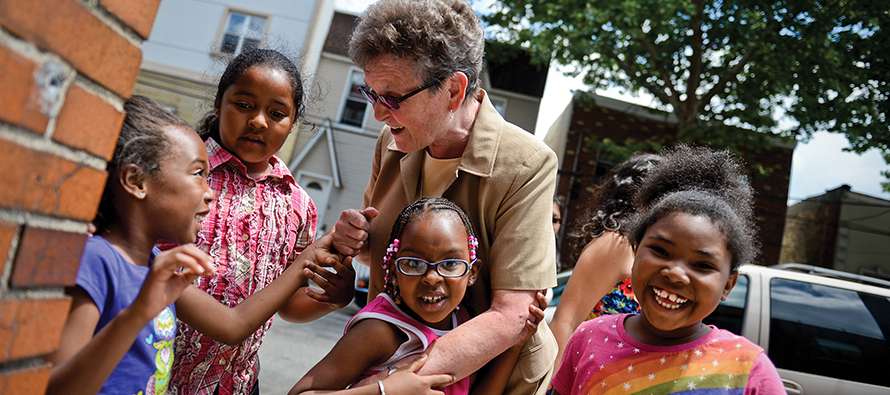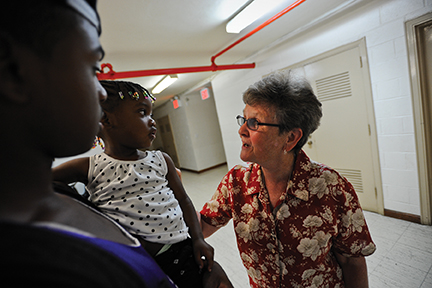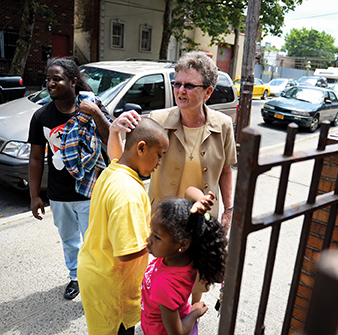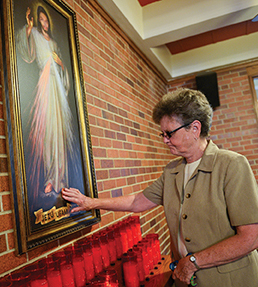Sister T: A mom to moms behind bars

Image: Sister Tesa Fitzgerald, C.S.J. talks to kids from Hour Children foster care home she helped found. “I love the way my life turned out, “ says Sister T.
Sister Tesa Fitzgerald, C.S.J. never thought she would be a mother. But—and she is the first to admit it—God works in mysterious ways. Those enigmatic ways have led Fitzgerald to help raise thousands of children for mothers who are incarcerated—and become a mother to the women themselves.
“They’re all my babies,” she says, talking about her unconventional and very large family.
Today Fitzgerald, best known throughout her neighborhood in Queens, New York as “Sister T,” is the executive director of Hour Children, a nonprofit that supports women prisoners and their children in the state of New York. The organization—named for the one-hour family visits that prisoners get—helps moms in prison stay in touch with their kids while they serve time, raises those children as fosters while the mothers are incarcerated, and then helps the women rebuild their lives after their release.

“It became very clear to me that the [incarcerated] mothers didn’t have the opportunities that the children deserved,” Fitzgerald says. She wanted something more for all of them.
Hour Children has created a village in a small section of Long Island City, not far from the East River. Fitzgerald and her staff maintain a food pantry for the women when they first live on their own outside of prison. One building houses the Working Women Program, where the former inmates are taught life and career skills and are prepped for internships and jobs all over Queens, including at the local Con Edison plant, which Fitzgerald spent years persuading to hire her women. There is a day-care center where women can leave their kids while they go to their new jobs. There are four thrift stores that generate income for the nonprofit and provide another place for the women to work after they are released.
Small things make for a big life
Then there is the foster home that Fitzgerald runs with her fellow Sisters of St. Joseph.
Fitzgerald thought hard about how to name the home where she and the sisters live with the foster children. She didn’t want the children in their care to feel alienated from the other kids in the neighborhood or at school, the ones who had parents to go home to, so they named the building “My Mother’s House.” That way, when they were asked where they were going, they never felt like they were lying. They said, “My Mother’s House,” and no one asked them any more questions.
Fitzgerald always thinks of the small things that are actually big things. As a result, she lives a big life, one she has largely carved out for herself. She isn’t the kind of woman who takes no for an answer, and when faced with an obstacle, this diminutive powerhouse finds a way to turn that obstacle on its head.
Fitzgerald’s job starts in the prisons, and she visits the women there on a regular basis. Much of her work is on the prison grounds, where she counsels women starting as soon as they have gone in. She lets them know what life is going to be like for them when they get out, and she doesn’t mince words when it comes to the challenges they will face.

When they are released, she is right there once again. She finds them affordable housing, oftentimes maintained and managed by Hour Children, helps them secure a job, and teaches them computer skills and office etiquette. Women must comply with sober and communal living restrictions and responsibilities. They ultimately need to get a job. If they can do that, Fitzgerald will help support them and their kids as long as they need the help.
Tasting hope
It’s a simple idea, but an effective one. More than 29 percent of New York State’s female ex-convicts are eventually rearrested. For women taken in by Hour Children, that number is only 3 percent.
But there’s so much more to these turnaround stories than numbers. Luz De Leon, who met Fitzgerald while serving 10 years in Bedford Hills Correctional Facility for manslaughter, now runs one of the thrift shops operated by Hour Children in Queens.
“Tesa taught me everything I know about doing my job. She changed my life. She’s the reason I am here right now,” De Leon says.
Spend some time with any of the women who have walked through Hour Children’s doors and you will understand the real definition of hope and family and faith.
“You can taste the hope in prison,” Fitzgerald says. Each of the women she has worked with hit rock bottom right before they met her, and she helps them go up from there. She cries with the women in jail. She prays with them and she mourns with them. She and the other sisters in her community take on all the duties of these mothers for newborn babies to rowdy teenagers.
“It was a real eye-opener. I got a crash course in empathetic understanding of what parents go through,” Fitzgerald says. “It was hard. You had highs and lows. You had to let each child be an individual. The babies were actually easier to bond with. It was harder with the teenagers who came in with all the baggage of life. It sure was a different model. We had five sisters raising the children and we did all the things a parent would do. I became a mom.”
Fitzgerald never judges anyone, especially not the women she works with. She shows them understanding and compassion, perhaps for the first time in their incredibly difficult lives.
“If we really believe in the Resurrection, then we have to believe in second chances. Nobody comes out of prison saying, ‘Wow, I really hope I screw up again,’ ” she says.
A calling of “of course” not “aha”
Fitzgerald never had that one moment where she knew she wanted to become a sister. Rather, she just always felt a subtle sense that becoming a sister was her calling, an idea that was further fostered by the Sisters of St. Joseph who taught her in high school.
“It was this inner sense that this was a good thing for me to do. It wasn’t an ‘aha’ moment, where I woke up and said, ‘Hey, I want to be a nun today.’ It was just a constant calling from God,” she explains. “The sisters seemed so happy and they were doing good things, so it just made sense to me.”

She grew up poor in an Irish working-class family in Long Island, New York. Strong faith and good education were inherent in her upbringing and so, all these years later, it just makes sense that those things continue to be the cornerstones of Fitzgerald’s life.
“I love the way my life turned out,” she says.
God: her closest advisor
Fitzgerald hasn’t been shy about asking God for things. She asked for help trying to build more housing for her women and their families, and she got it—in the form of more than $9 million in funding to buy an old convent across the street from where she lives. She demolished the building and set about reconstructing it into 18 beautiful apartments for her women.
Fitzgerald struts when she walks, shoulders strong and proud. Long Island City neighbors approach her with hugs, high-fives, and smiles. In Queens she is everyone’s mother and everyone’s friend.
Her closest advisor and a constant in Fitzgerald’s life is none other than God. “God walks with me every single day,” she says. The two of them have conversations on a regular basis. She’s making plans and she wants God to be in on them. Who knows how she and God are planning to spread hope next?
Related article: vocationnetwork.org, “Teacher first, sister always,” Vision 2010.
Tags
Related
- Seeing God in a child’s smile: Profile of Sister Marie Elizabeth Jerry, S.S.F.
- Bringing sacred healing to hurting communities
- Sisters help Uvalde move from trauma to trust
- Camaraderie at its best: Profile of Sister Kristine Fernandes, C.S.J.
- My millennial response to a perennial call
- Goodbye L.A., hello heartland: Profile of Sister Jessica Vitente, S.P.
- A zigzagging road to the convent
- Sister Maggie has a mission
- Living simply, centered on prayer
- Sisterhood is different from singlehood Read More
Most Viewed
- Find your spirituality type quiz
- FAQs: Frequently asked questions about vocations
- Celibacy quiz: Can you live a celibate life?
- Resources for older discerners or those with physical and developmental differences
- About Vocation Network and VISION Guide


